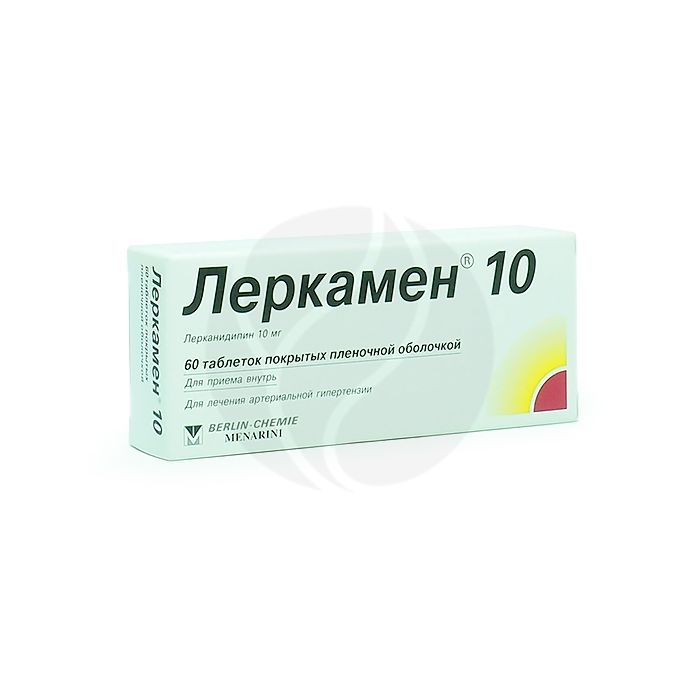Lerkamen tablets p / o 10mg, No. 60
Expiration Date: 05/2027
Russian Pharmacy name:
Леркамен таблетки п/о 10мг, №60
- essential hypertension of the I-II degree of severity.
The drug is taken orally, at least 15 minutes before meals, preferably in the morning, without chewing, drinking plenty of water.
Assign 10 mg 1 time / day. Depending on the individual patient's tolerance of the drug, the dose may be increased to 20 mg.
The therapeutic dose is selected gradually, because the maximum antihypertensive effect develops approximately 2 weeks after the start of the drug. It is unlikely that the effectiveness of the drug will increase with increasing doses of more than 20 mg / day, at the same time, the risk of side effects increases.
1 film-coated tablet contains:
Core
Active ingredient : lercanidipine hydrochloride
Excipients : lactose monohydrate, microcrystalline cellulose, sodium carboxymethyl starch (type A), povidone - K 30, magnesium stearate.
Sheath
Opadry OY-SR-6497 consisting of : hypromellose, talc, titanium dioxide, Macrogol 6000, iron oxide yellow dye.
- Hypersensitivity to other derivatives of the dihydropyridine series;
- untreated heart failure;
- unstable angina pectoris;
- obstruction of blood vessels emanating from the left ventricle of the heart;
- the period within 1 month after the transferred myocardial infarction;
- severe liver failure;
- severe renal failure (CC less than 30 ml / min);
- simultaneous use with CYP3A4 inhibitors (ketoconazole, itraconazole, erythromycin, ritonavir, troleandomycin);
- simultaneous use with cyclosporine;
- simultaneous reception with grapefruit juice;
- lactose intolerance, lactase deficiency, glucose-galactose malabsorption syndrome;
- pregnancy and lactation (breastfeeding);
- use in women of childbearing age who do not use reliable methods of contraception;
- children and adolescents up to 18 years old (efficacy and safety have not been studied);
- hypersensitivity to the components of the drug.
Pharmacological action
Selective blocker of slow calcium channels with a predominant effect on blood vessels, a derivative of dihydropyridine. Inhibits the transmembrane flow of calcium ions into vascular smooth muscle cells. The mechanism of the antihypertensive action of lercanidipine is due to a direct relaxing effect on vascular smooth muscle cells, as a result of which the systemic vascular resistance decreases.
Indications
- essential hypertension of the I-II degree of severity.
Contraindications
- Hypersensitivity to other derivatives of the dihydropyridine series;
- untreated heart failure;
- unstable angina pectoris;
- obstruction of blood vessels emanating from the left ventricle of the heart;
- the period within 1 month after the transferred myocardial infarction;
- severe liver failure;
- severe renal failure (CC less than 30 ml / min);
- simultaneous use with CYP3A4 inhibitors (ketoconazole, itraconazole, erythromycin, ritonavir, troleandomycin);
- simultaneous use with cyclosporine;
- simultaneous reception with grapefruit juice;
- lactose intolerance, lactase deficiency, glucose-galactose malabsorption syndrome;
- pregnancy and lactation (breastfeeding);
- use in women of childbearing age who do not use reliable methods of contraception;
- children and adolescents up to 18 years old (efficacy and safety have not been studied);
- hypersensitivity to the components of the drug.
Method of administration and dosage
The drug is taken orally, at least 15 minutes before meals, preferably in the morning, without chewing, drinking plenty of water.
Assign 10 mg 1 time / day. Depending on the individual patient's tolerance of the drug, the dose may be increased to 20 mg.
The therapeutic dose is selected gradually, because the maximum antihypertensive effect develops approximately 2 weeks after the start of the drug. It is unlikely that the effectiveness of the drug will increase with increasing doses of more than 20 mg / day, at the same time, the risk of side effects increases.
Side effects
Headache, dizziness, paresthesia, confusion, blurred vision, tinnitus, marked decrease in blood pressure, arrhythmias, angina pectoris, myocardial infarction or stroke, vasculitis, cough, shortness of breath, bronchospasm, rhinitis, nausea, vomiting, abdominal pain, asthenia, dyspepsia, diarrhea, constipation, dryness of the oral mucosa, pancreatitis, skin rash, itching, angioedema of the face, extremities, urticaria, myalgia, polyuria.

